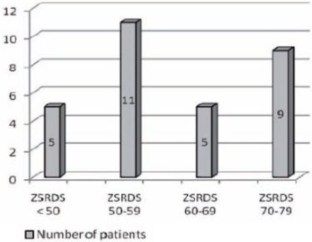Konference: 2011 2. pražské mezioborové onkologické kolokvium
Kategorie: Psychoonkologie
Téma: Postery
Číslo abstraktu: p03
Autoři: Mjr. doc. MUDr. Ladislav Slováček, Ph.D.; MUDr. Birgita Slováčková, Ph.D.; MUDr. Peter Priester; MUDr. Iva Slánská; prof. MUDr. Jiří Petera, Ph.D.; prof. MUDr. Stanislav Filip, Ph.D., DSc.; MUDr. Jindřich Kopecký, Ph.D.
Background
Depression is seen in many cancer patients. It occurs in approximately 25% of palliative care patients. It is widely recognised by clinicians that depression is a difficult symptom to identify among patients with advanced illness.
Aim
The study is aimed for screening for depression among metastatic ovarian cancer survivors in a programme of palliative cancer care.
Materials and Methods
This study was local, prospective and cross-sectional. It was carried at Department of Clinical Oncology and Radiation Therapy of Charles University Hospital and Faculty of Medicine in Hradec Kralove, Czech Republic. Dates were obtained during years 2007-2009 among 30 metastatic ovarian cancer survivors in a programme of palliative cancer care. The mean age for all 30 survivors was 62.1 years (aged 41-88 years). The Czech version of Zung Self-rating Depression Scale was perfomed for screening of depression symptoms.
Results
- The statistical evaluation presents that mean ZSRDS certifies the presence of signs of mildly depression among metastatic ovarian cancer survivors (ZSRDS range was 50-59). The mean ZSRDS in all survivors was 58.7. The mean ZSRDS in group of healthy females was 38.9 (normal range) (see Graph 1).
- The incidence of depression was 83% (25 of all 30 survivors). The relevance of depression among metastatic ovarian cancer survivors is characterized: severely depressed were proved in 9 of all 30 survivors, the moderately depressed in 5 of all 30 survivors, mildly depressed in 11 of all 30 survivors, normal range in 5 of all 30 survivors (see Graph 2).
- The statistical evaluation does not present statistically significant dependence of ZSRDS on smoking abuse, on marital status symptoms, on age, on number of associated diseases and on type of palliative cancer care.
Conclusion
The results of the pilot depression study showed that subsist clear association between metastatic ovarian cancer and depression.
Acknowledgements
Supported by the Research Project of the Ministry of Health of the Czech Republic No. 00179906 and the Specific University Research of Charles University in Prague No. 53251.
Graph 1. Comparison of values of mean ZSRDS in metastatic ovarian cancer survivors and healthy females (N = 60, p < 0.05)

Graph 2. Occurence and relevance of depression in metastatic ovarian cancer survivors (N = 30)

e-mail: ladislav.slovacek@seznam.cz
Datum přednesení příspěvku: 19. 8. 2011
